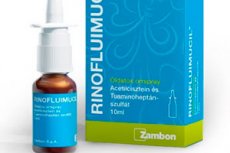Medical expert of the article
New publications
Preparations
Rhinofluimucil in pregnancy
Last reviewed: 04.07.2025

All iLive content is medically reviewed or fact checked to ensure as much factual accuracy as possible.
We have strict sourcing guidelines and only link to reputable media sites, academic research institutions and, whenever possible, medically peer reviewed studies. Note that the numbers in parentheses ([1], [2], etc.) are clickable links to these studies.
If you feel that any of our content is inaccurate, out-of-date, or otherwise questionable, please select it and press Ctrl + Enter.

Medicines during pregnancy – even for the treatment of a runny nose – should be prescribed by the attending physician, and, as stated in the instructions, the ratio of the expected benefit for the pregnant woman and the possible risk to the unborn child should be assessed.
Some versions of the instructions note that Rinofluimucil is prescribed during pregnancy according to this principle.
Can Rinofluimucil be used during pregnancy? It is not possible to use drops, since this product is available in the form of a spray. But the main thing is that the instructions from the manufacturer of this drug (the Italian company Zambon) indicate that it is not recommended to use it during pregnancy - either in the early or late stages.
Indications Rhinofluimucil in pregnancy
Rinofluimucil is intended for the treatment of rhinitis (nasopharyngitis) and inflammation of the paranasal sinuses (sinusitis, maxillary sinusitis) of an acute, subacute and chronic nature with the formation of viscous nasal secretion - serous-purulent, as well as vasomotor rhinitis with difficulty breathing through the nose. [ 1 ]
Pharmacodynamics
The pharmacological action of the drug is provided by its components: the sympathomimetic tuaminoheptane sulfate (2-aminoheptane) and the mucolytic acetylcysteine - a derivative of the aliphatic sulfur-containing amino acid cysteine.
Acetylcysteine thins bronchial and nasal mucus by depolymerizing proteoglycan and glycosaminoglycan molecules, breaking covalent bonds in their anionic sulfate amino groups.
And tuaminoheptane acts as a topical decongestant – constricting the blood vessels of the nasal mucosa and reducing swelling.
Pharmacokinetics
When applied locally (intranasally), the bioavailability of acetylcysteine does not exceed 3%. It is noted that Rinofluimucil spray does not enter the bloodstream, therefore it does not act systemically.
Dosing and administration
The product is introduced into the nasal cavity using a sprayer with a dispenser (one press of the valve corresponds to one dose).
Adults are recommended to administer two doses into each nasal passage (no more than four times during the day); children aged 12-16 years – one dose.
The maximum duration of use is five days.
Contraindications
Rinofluimucil is contraindicated in hyperthyroidism, severe arterial hypertension, closed-angle glaucoma, pheochromocytoma. It is not prescribed to children under 12 years of age and patients who have undergone surgery on the pituitary gland and dura mater of the brain.
Side effects Rhinofluimucil in pregnancy
The drug may cause side effects in the form of an allergic reaction (urticaria, facial swelling, difficulty breathing); nausea and vomiting; dry mucous membranes of the mouth and nasopharynx; increased heart rate and blood pressure; urinary disorders; tremors and nervous excitement.
Like all intranasal decongestants, Rinofluimucil can cause tachyphylaxis and dependence.
Overdose
Overdose of Rinofluimucil leads to an increase in its side effects such as increased blood pressure, tachycardia, tremor, agitation; and symptomatic treatment is used to eliminate them.
Interactions with other drugs
Among the drug interactions of Rinofluimucil, its incompatibility with drugs for lowering blood pressure (beta-blockers); cardiotonic agents of the cardiac glycoside group; with tricyclic antidepressants and psychotropic drugs of the monoamine oxidase inhibitor (MAO) group; dopaminergic drugs for the treatment of Parkinson's disease are noted.
Storage conditions
The drug should be stored at normal room temperature.
Shelf life
Rinofluimucil is valid for 30 months (unopened); opened bottle – three weeks.
Analogues
Analogues of this drug should thin thick nasal secretions and ensure normal nasal breathing; these include Nazol and Nazalong sprays, Pinosol drops, and Aqua Maris spray. Read more - How to treat a runny nose during pregnancy?
Reviews
Acetylcysteine is a substance that has not been tested for safety during pregnancy. The instructions for Rinofluimucil do not contain information that tuaminoheptane sulfate was previously used as a stimulant, as it releases the neurotransmitter norepinephrine and inhibits its reuptake. In 2011, the World Anti-Doping Agency (WADA) added this substance to the list of prohibited substances.
Reviews from obstetricians and gynecologists regarding the use of this drug during pregnancy concern cases of increased uterine tone in pregnant women, for whom Rinofluimucil is unsafe to use in the first trimester of pregnancy.
In addition, foreign studies have shown that norepinephrine reuptake inhibitors taken in the 3rd trimester of pregnancy increase the risk of postpartum hemorrhage. Therefore, Rinofluimucil should not be used in the 3rd trimester of pregnancy either – even in the most extreme cases.
The authors of the reference book Drugs During Pregnancy and Lactation: Treatment Options and Risk Assessment note that sympathomimetics [ 2 ] taken at the end of pregnancy can reduce the contractility of the uterine muscles, that is, lead to a weakening of labor, and in the fetus can cause tachycardia. [ 3 ]
Attention!
To simplify the perception of information, this instruction for use of the drug "Rhinofluimucil in pregnancy" translated and presented in a special form on the basis of the official instructions for medical use of the drug. Before use read the annotation that came directly to medicines.
Description provided for informational purposes and is not a guide to self-healing. The need for this drug, the purpose of the treatment regimen, methods and dose of the drug is determined solely by the attending physician. Self-medication is dangerous for your health.

